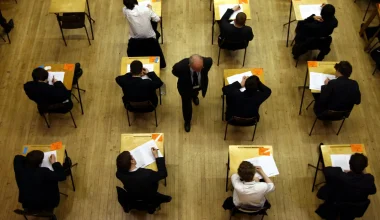What happens when you don’t go to school in the UK? In the United Kingdom, it is compulsory for all children and young people to be in education or training until they reach the age of 18. This means that they must either attend school, college, or an apprenticeship program.
There are a few exceptions to this rule, such as if a child has a medical condition that prevents them from attending school or if they are home-educated.
However, if a child or young person does not attend school or other education or any scheme program without a good reason, they are considered to be truanting. Truancy is a serious issue, and it can have a significant impact on a child’s future.
It is important to note that school attendance is not a silver bullet. There are other factors that also contribute to a child’s success, such as family support and access to quality education. However, school attendance is an essential foundation for a child’s future success.
Table of Contents
- Why is School Attendance Important in the UK?
- What Happens When You Don’t Go To School in the UK?
- Is it Illegal not to go to School UK?
- What Can Be Done to Help Children Attend School Regularly?
- What Does Your School Do if You Miss School?
- Does School Truancy Affect Your Parent(s) or Legal Guardian?
- How can parents help prevent school truancy?
- What is Considered Bad School Attendance?
- How Does Not Going to School Affect You?
- What Age Can You Legally Leave School?
- When is it Okay Not to Go to School?
- What to Do if You Don’t Want to Go to School
- What Happens to my Student Visa if I Drop Out
Why is School Attendance Important in the UK?
School attendance is important in the UK for a number of reasons. First, it is essential for academic qualifications. Studies have shown that there is a strong correlation between school attendance and academic performance. Children who attend school regularly are more likely to achieve higher grades and meet or exceed academic standards.
Second, school attendance is important for social and emotional development. The school provides children with opportunities to develop important social skills such as communication, teamwork, and conflict resolution. It also helps children to develop a sense of self-identity and belonging.
Third, school attendance is important for future success. Children who attend school regularly are more likely to go on to higher education and employment. They are also more likely to earn higher incomes and have better health outcomes.
Related Post: Do You Have to Pass English Literature? What’s Most Important in 2023
What Happens When You Don’t Go To School in the UK?
If you do not go to school in the UK, there are a number of consequences that you may face. A community order, an up to three-month jail sentence, or a fine of up to £2,500 could be imposed upon you. You are also granted a Parenting Order by the court.
Legal consequences
It is a legal requirement for all children in the UK to attend school between the ages of 5 and 16. Parents and care givers are responsible for ensuring that their children attend school regularly. If a child misses school without a good reason, the parent or care giver may be fined or prosecuted.
In serious cases, a child may be taken into care if they are not attending school. This is because the government has a duty to ensure that all children receive an education.
Educational consequences
A child’s education can be greatly impacted by missing school. A child loses out on crucial knowledge and education when they miss school. Because of this, it could be challenging for them to meet their academic goals and stay up with their peers.
Social and emotional consequences
What happens when you don’t go to school in the UK? The social and emotional growth of a young child may suffer as a result of missing school. Kids who skip school might not have as many chances to form friendships and hone their social skills. It’s possible that they feel excluded and alone.
Future consequences
Missing school can also have a negative impact on a child’s future prospects. Children who miss school are less likely to go on to higher education and employment. They are also more likely to earn lower incomes and have poorer health outcomes.
Is it Illegal not to go to School UK?
Yes, it is illegal not to go to school in the UK. Education is compulsory for all children aged 5 to 16, either at school or otherwise. This means that parents have a legal responsibility to ensure that their children receive an education, even if they choose to homeschool them.
There are a few exceptions to the compulsory education rule. For example, children with certain medical conditions or disabilities may be exempt. However, these cases are assessed on an individual basis.
What happens when you don’t go to school in the UK?. If parents do not send their children to school without a valid reason, they may be fined or even imprisoned. In serious cases, their children may be taken into care.
Is it compulsory to go to school UK?
The compulsory education age in the UK was raised to 18 in England in 2013. However, this does not mean that all children must attend school until they are 18. After the age of 16, young people can choose to continue their education, enter an apprenticeship, or start work. However, they must still participate in some form of education or training until they are 18.
The UK government believes that education is essential for all children and young people. It helps them to develop the skills and knowledge they need to succeed in life and to contribute to society.
Related Post: How Long Are A-Level Exams?
What Can Be Done to Help Children Attend School Regularly?
There are a number of things that can be done to help children attend school regularly.
Parents and care givers can:
- Make sure that their child has a good bedtime routine and gets enough sleep.
- Provide their child with a healthy breakfast and lunch.
- Talk to their child about the importance of school attendance and set clear expectations.
- Help their child to get to and from school on time.
- Communicate with the school if their child is having any problems.
What Happens When You Don’t Go To School in the UK?
Schools can:
- Create a welcoming and supportive environment for all students.
- Make learning fun and engaging.
- Provide support for students who are struggling academically or socially.
- Communicate regularly with parents and care givers.
The government can:
- Provide funding for schools to support students who are at risk of missing school.
- Work with parents and care givers to raise awareness of the importance of school attendance.
- Take action against parents and care givers who fail to ensure that their children attend school regularly.
What Does Your School Do if You Miss School?
The specific actions that your school will take if you miss school will vary depending on the school’s policies and procedures. However, most schools will follow a similar process:
- Contact your parents: Your school will likely contact your parents to let them know that you are absent. They may do this by phone, email, or text message.
- Determine the reason for your absence: Your school will want to know why you are absent in order to determine the next steps. If you have a valid reason for your absence, such as illness or a family emergency, your school may be able to excuse your absence.
- Make up any missed work: If your absence is excused, your school will likely expect you to make up any missed work. This may involve completing assignments, taking tests, or meeting with your teachers.
- Disciplinary action: If your absence is unexcused, your school may take disciplinary action against you. This may involve detention, suspension, or expulsion.
Related Post: How To Write Fast In Exam: A Quick Guide To Write Faster During Exams
Does School Truancy Affect Your Parent(s) or Legal Guardian?
Yes, school truancy can affect your parents or legal guardian in a number of ways. In many states, parents are legally responsible for ensuring that their children attend school. If your child is truant, your school may contact you to discuss the issue.
In some cases, your school may also take legal action against you, such as issuing a fine or filing a complaint with child protective services.
In addition, school truancy can have a number of negative consequences for your parents or legal guardian.
For example, if your child is truant, they may be more likely to engage in risky behaviors, such as substance abuse or delinquency. They may also be more likely to drop out of school and experience unemployment in adulthood.
If you are concerned about your child’s school attendance, it is important to talk to them about the issue. You should also contact your child’s school to discuss the school’s policies and procedures on truancy.
How can parents help prevent school truancy?
There are a number of things that parents can do to help prevent school truancy, including:
- Talk to your child about the importance of education: Make sure your child understands why it is important to go to school and learn.
- Establish a regular bedtime and wake-up time: This will help your child get enough sleep and be ready for school in the morning.
- Provide your child with a healthy breakfast: A nutritious breakfast will give your child the energy they need to focus and learn in school.
- Become involved in your child’s education: Volunteer in your child’s classroom, attend school events, and talk to your child’s teacher about their progress.
- Monitor your child’s school attendance: Be aware of how many days your child has missed school and contact their teacher if you are concerned about their attendance.
If you are struggling to help your child with truancy, there are a number of resources available to you, such as your child’s school, the local school district, and community organizations.
Related Post: What Time Do Primary Schools Start and Finish in the UK?
What is Considered Bad School Attendance?
School attendance is important for student success. When students miss school, they fall behind in their studies and may have difficulty catching up.
Bad school attendance can be defined as missing more days of school than is considered acceptable by your local school district. This can vary depending on the district, but it is typically more than 10% of the school year.
How Does Not Going to School Affect You?
Missing school can have a number of negative consequences, including:
- Falling behind in academic studies. When students miss school, they miss out on important lessons and assignments. This can make it difficult to catch up and succeed in class.
- Increased risk of dropping out. Students who have poor attendance are more likely to drop out of school altogether. This can have a serious impact on their future earnings and employment opportunities.
- Social and emotional problems. Missing school can also lead to social and emotional problems for students. They may feel isolated from their classmates and teachers, and they may have difficulty making friends.
What Age Can You Legally Leave School?
The age at which you can legally leave school varies from country to country. In the United States, the compulsory school attendance age varies by state. Most states require students to attend school until they are 17 or 18 years old. However, there are some exceptions, such as if a student has already earned a high school diploma or GED.
In the United Kingdom, the compulsory school leaving age is 16. However, students must continue to be in education or training until they are 18. This means that they can stay in school, go to college, or start an apprenticeship.
It is important to note that even if you are legally able to leave school, it is generally not recommended to do so without completing high school or earning a GED. A high school diploma is essential for many jobs and educational opportunities.
If you are considering leaving school early, it is important to talk to your parents, teachers, and school counselor. They can help you weigh the pros and cons and make the best decision for you.
Related Post: How Long is Sixth Form in the UK? A Guide To Private Sixth Form In The UK
When is it Okay Not to Go to School?
It is generally okay not to go to school if you are sick, have a family emergency, or have a religious holiday. Some schools may also allow excused absences for other reasons, such as college visits, job interviews, or special events.
If you are not sure whether or not it is okay to miss school for a particular reason, it is always best to check with your school’s attendance policy. You can also talk to your teacher or counselor about your situation.
Here are some examples of when it is okay not to go to school:
- You are sick and need to rest.
- You have a family emergency, such as a death in the family or a serious illness.
- You have a religious holiday.
- You have a college visit or job interview.
- You have a special event, such as a music recital or performance.
- You are feeling overwhelmed or stressed and need a day to take care of yourself.
What to Do if You Don’t Want to Go to School
If you don’t want to go to school, it is important to talk to your parents or guardians about why. They may be able to help you come up with a solution. For example, if you are struggling with a particular subject, they may be able to arrange for tutoring or extra help.
If you are being bullied, they may be able to talk to the school about how to address the situation.
If you are feeling overwhelmed or stressed, it is also important to talk to a trusted adult, such as a teacher, counselor, or parent. They can help you develop coping skills and strategies for managing your stress.
Here are some tips for talking to your parents or guardians about not wanting to go to school:
- Be honest about why you don’t want to go.
- Be specific about what you need. For example, if you are struggling with a particular subject, ask for help with that subject. If you are being bullied, ask for help in dealing with the situation.
- Be willing to compromise. Your parents or guardians may not let you miss school entirely, but they may be willing to let you miss a class or two.
- Be respectful and understanding. Your parents or guardians want what is best for you, so try to see things from their perspective.
If you are still feeling overwhelmed or stressed, there are resources available to help you. You can talk to a school counselor, therapist, or other mental health professional. There are also online resources and support groups available.
It is important to remember that you are not alone. Many people experience school stress and anxiety. There are people who care about you and want to help you. Please reach out for support if you need it.
Related Post: When is the Student Finance Application Deadline in the UK?
What Happens to my Student Visa if I Drop Out
In most cases, this status change procedure takes 21 days. As soon as your F-1 status is revoked, you must depart the United States.
If you don’t depart the United States within 180 days of dropping out, you may face the following penalties: You may be barred from submitting an application for any kind of U.S. visa for a maximum of three years.
FAQs on What Happens When You Don’t Go To School in the UK?
The compulsory school leaving age in the UK is 16. However, young people must remain in education or training until they reach the age of 18.
The exceptions to the compulsory school leaving age include:
Homeschooling
Medical conditions that prevent a child from attending school
Education and training outside of school, such as apprenticeships or college courses
Fines
Parenting orders
Imprisonment
In Summary: What Happens When You Don’t Go To School in the UK?
School attendance is important for all children. It is essential for academic achievement, social and emotional development, and future success.
If you are concerned about your child’s school attendance, please talk to their teacher or another member of school staff. They can provide support and help you to develop a plan to improve your child’s attendance.
Truancy is a serious issue that can have a significant impact on a child’s future. There are a number of things that can be done to help people who are not going to school, such as tackling bullying, improving mental health support, meeting the needs of children with special educational needs, addressing family problems, and making school more engaging.
References
- thinkstudent.co.uk ______ What Happens if You Don’t Go To School in the UK?
- rochaksafar.com ______ What Happens If You Don’t Go To School?
- amazon.co.uk _______ What Would Happen If You Don’t Go to School?




